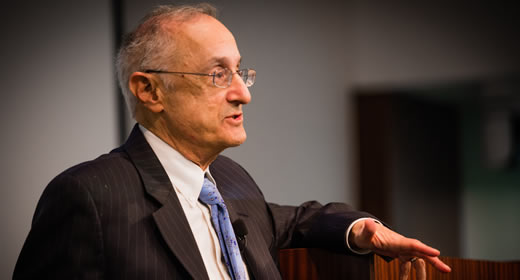
ANN ARBOR—As science, education and technology have taken on ever-increasing roles in society during the past two centuries, researchers at the University of Michigan have identified corresponding changes in cognition.
Robert Axelrod, U-M professor of public policy and political science, and Rumen Iliev, a former U-M postdoctoral researcher, found an increase in the amount of causal—or cause and effect—language used in western society.
The research, published in Psychological Science, builds on previous studies that link cognitive processing to cultural and societal factors. Unlike previous cross-cultural work that compared different cultures at the same point of time, this project was focused on comparing the same culture at different time points.
Traditionally, the researchers of culture and cognition have assumed that cross-cultural differences can be traced back to ancient times, yet there has been very little empirical work on the timeline of such changes.
"The increased attention to causality in western society isn't surprising given the increasing role of formal schooling, popular science and everyday technology," Axelrod said. "What was surprising was that we were able to empirically verify this hypothesis, even in the absence of direct psychological measures."
Axelrod and Iliev used a dictionary of causal language developed by James Pennebaker of the University of Texas to test their hypothesis, which was the increased role of education, science and technology in western societies should be accompanied by greater attention to causal connections. The dictionary included words such as because, since, hence and why.
In one study, they compared the word frequencies in English texts from Google books, New York Times and Scientific American databases at different time periods and found roughly a 40 percent increase of causal language for the last two centuries—with most of that increase occurring in the 20th century.
They conducted another study to ensure that the increase found in the first study couldn't just be explained by historic changes in the specific causal vocabulary.
They compared 28 texts written by the most influential historical thinkers who had worked on causality, such as Thomas Aquinas, Isaac Newton and Rene Descarte, against a group of 32 texts written by English language authors who worked before the 20th century, such as Jane Austen, Herman Melville and Charles Dickens.
The texts studied were obtained from Project Gutenberg, which provides digital copies of public domain books. The causal dictionary was able to differentiate between the two groups of authors, suggesting that the observed quantitative change could not be attributed to a semantic shift in the meaning of the causal words.
"Our research also sought to demonstrate the value of automated text analysis as a tool for cultural changes over time," said Iliev, now at Stanford University. "New technologies are allowing us to empirically address scientific questions, which we could have only speculated about until recently."
Contact: Greta Guest, 734- 936-7821, [email protected]; U-M has a satellite uplink TV studio and an ISDN radio line for interviews.